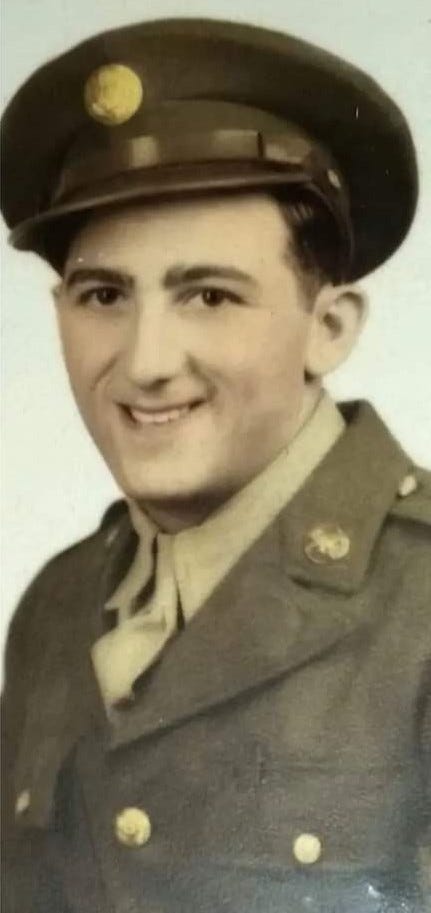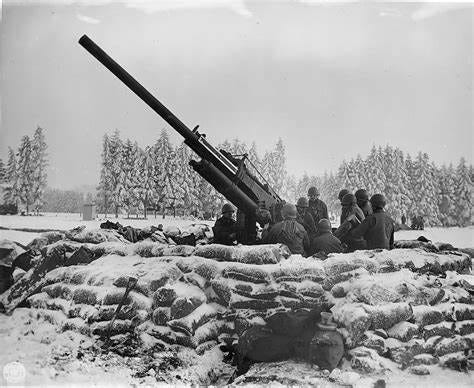Remembering My Father's Christmas at War in 1944
We cannot forget the history which makes our freedom possible today.
When you get old like I am, Christmas tends to be more about reminiscing than it is about this year’s holiday. With Christmas almost here, I am going to post memories of Christmases past. This year has been a roller coaster. I shouldn’t be here typing on my laptop. When my Cardiologist came into the room to give me the results of my heart catheterization he said, “I don’t know how you are alive.” My cardiac arteries were almost completely blocked, and he was amazed I hadn’t died of a heart attack quite some time ago. I had open heart surgery within days of the test results and after only one brief complication, I have fully recovered.
It’s hard to explain the feeling of being blessed to be alive and the guilt that I didn’t die when people close to me lost their battles with cancer, illness, accidents, and age this year. This is a becoming “It’s A Wonderful Life” Christmas as God let me live again.
See the first two installments in this series:
My third and final Christmas memory I’ll share is not my memory, but my father’s.
Fred Tribuzzo’s wonderful piece “White Christmas” reminded me that my stories were good and heartwarming but there are other stories about Christmas that need to be shared, actually it is our responsibility to share them, so they are not forgotten.
When I was between jobs a few years ago, I became a substitute teacher at my son’s private high school. I enjoyed the majority of my time there, especially when I would sub for the history teacher.
The class was learning about the Korean War, and I quickly read the chapter in a free period before the class. When the class began, I started asking questions without any responses. It is tough for subs to get a class involved so I pushed. I asked basic questions about World War II and what lead up to the “Conflict” in Korea. I finally asked for someone to name one major battle from World War II and started calling on kids. No one could answer.
I did the entire hour of class off the top of my head from the end of World War II, the rise of communism and then into Korea. After the class one of the students told the principal that they had learned more in that hour than they had learned all year.
Why is that story important? It points out that we are failing to teach our real history. So, thanks to Fred for reminding me that stories like my father’s experience during Christmas 1944 needs to be told.
My father turned eighteen in 1942 and was drafted right after graduating from high school. He was assigned to an Anti-Aircraft Battalion, trained at Camp Davis, North Carolina and was eventually sent to England to await the D-Day invasion.
His 116th Anti-Aircraft Battalion landed on Utah Beach later in the day on June the 6th and fought their way across France in the following months. After the Luftwaffe lost its ability to wage war, the 116th AAA was reassigned from their primary role to guard the skies and their 90mm guns were repurposed as anti-armor units. They were moved to the front lines and attached to Infantry units
As Christmas 1944 approached the Germans appeared to be on the run and the 116th AAA was in Belgium, in the 7th Army area, hunkered down in defensive positions. On December 16, 1944, the Germans attacked in strength to begin what was known as the Battle of Bulge. Many American units were overrun with eighty-five American POWs massacred by the Germans at Malmedy.
The 116th AAA was surrounded on three sides, but they dug in on the northern flank of the Bulge and held their portion of the line with their Infantry counterparts. They were low on food, ammunition and were faced with temperatures well below freezing and snow that did not allow air cover or resupply.
As Christmas approached the situation became more dire. Casualties mounted both from battle and from the cold. Details were sent back to the makeshift morgue to get boots, socks and other clothing from the dead. They were critically low on food and ammunition by this point and consolidated positions on half the 90mm guns so they could remain combat effective. Still they held on.
Heroism in the stand against the German offensive became legendary. The troopers of the famous 101st Airborne Division were completely surrounded but held on to the crossroad town of Bastogne. When asked to surrender Brig. Gen. Anthony McAuliffe, acting commander of the 101st, responded, "Nuts!”
My twenty-year-old father spent Christmas 1944 in a foxhole somewhere in Belgium, hungry, cold, maybe wearing the gift of an unfortunate soldier’s socks to try to keep his feet warm. I’m sure he was filled with the memories of Christmases past with his parents, eight sisters, and brother. I’m sure he wanted to be home but he and his fellow soldiers did not waver.
I’m sure the many cold winter nights in Syracuse brought back memories that he probably wanted to forget. But what he did as part of the heroic effort to stop the German offensive should not be forgotten. The only thing that he ever told me about the battle was that he eventually contracted pneumonia and was sent to the hospital.
That generation is almost all gone. My father died at the VA Hospital in Syracuse in 2006. We must continue to honor their service.
I understand the need to expand the scope of the teaching of our history, warts and all, but this effort should not be accomplished by diminishing the heroes who gave so much when the world and freedom were on the brink of collapse.
Please watch or rewatch “Band of Brothers” on HBO. Watch “The Pacific” also on HBO. Read all the books about World War II by Stephen Ambrose. Learn about segregation and the home front too but make sure you learn about my old unit, the 1st Infantry Division at Omaha Beach. Remember what they did.







